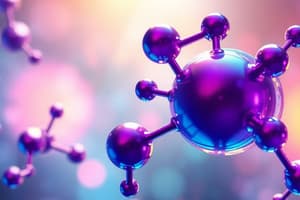Podcast
Questions and Answers
What is the role of functional groups in organic compounds?
What is the role of functional groups in organic compounds?
- Determine the color of the compound
- Affect the compound's properties and reactivity (correct)
- Decrease the compound's stability
- Increase the pH of the compound
Which type of bond allows carbon to form complex structures?
Which type of bond allows carbon to form complex structures?
- Hydrogen bond
- Ionic bond
- Metallic bond
- Covalent bond (correct)
In organic chemistry, what are carboxyl groups responsible for?
In organic chemistry, what are carboxyl groups responsible for?
- Affecting chemical behavior (correct)
- Increasing acidity
- Stabilizing the molecule
- Increasing basicity
What is the main focus of organic chemists regarding reactions?
What is the main focus of organic chemists regarding reactions?
Which type of reaction involves electron transfer between molecules?
Which type of reaction involves electron transfer between molecules?
What type of bonding allows carbon to bond with itself and other elements?
What type of bonding allows carbon to bond with itself and other elements?
What is the main focus of electrophilic aromatic substitution reactions?
What is the main focus of electrophilic aromatic substitution reactions?
What is the essential feature of polymers in organic chemistry?
What is the essential feature of polymers in organic chemistry?
Which area does not directly benefit from organic chemistry according to the text?
Which area does not directly benefit from organic chemistry according to the text?
How do nucleophilic substitution reactions differ from electrophilic aromatic substitution reactions?
How do nucleophilic substitution reactions differ from electrophilic aromatic substitution reactions?
Which field heavily relies on the understanding of organic chemistry to synthesize compounds for specific purposes?
Which field heavily relies on the understanding of organic chemistry to synthesize compounds for specific purposes?
What makes synthetic biology possible in terms of organic chemistry?
What makes synthetic biology possible in terms of organic chemistry?
Flashcards are hidden until you start studying
Study Notes
Organic Chemistry: Exploring Carbon-Based Molecules
Organic chemistry, a vibrant and diverse branch of chemistry, delves into the world of carbon-based molecules. Carbon, known for its ability to form strong covalent bonds, provides the foundation for a vast array of organic compounds that are integral to everyday life.
The Carbon Skeleton
Carbon's unique ability to bond with itself and other elements through single, double, and triple covalent bonds lends itself to the formation of complex, intricate structures. This versatility allows for a wide variety of functional groups, which significantly affect a compound's properties and reactivity.
Functional Groups
Functional groups are specific atoms or groups of atoms within a molecule that are responsible for the molecule's characteristic chemical behavior. Examples include hydroxyl groups (-OH), carboxyl groups (-COOH), and amino groups (-NH2). Organic compounds with different functional groups can undergo diverse chemical reactions, leading to the synthesis of new molecules.
Reactions in Organic Chemistry
Organic chemists study and develop various reactions, such as:
- Esterification: The formation of ester bonds between a carboxyl group and an alcohol.
- Acid-base reactions: Proton transfer between acids and bases, resulting in the formation of new products.
- Oxidation-reduction reactions: Electron transfer between molecules, leading to changes in their oxidation states.
- Substitution reactions: The replacement of one functional group with another, such as nucleophilic substitution reactions.
- Electrophilic aromatic substitution: Reactions that involve the addition of an electrophile to an aromatic ring, leading to the formation of new functional groups.
- Polymers: Long chains of repeated molecular structures, which can be synthesized from organic monomers via polymerization reactions.
Importance of Organic Chemistry
Organic chemistry has numerous practical applications:
- Pharmaceuticals: The development of new drugs requires an understanding of organic chemistry to synthesize small molecules that can interact with biological targets.
- Agriculture: Pesticides, herbicides, and fertilizers are organic compounds that help maintain food production and improve crop yields.
- Materials science: Polymers, such as plastics and rubber, are essential in engineering and manufacturing.
- Synthetic biology: The manipulation of biomolecules using organic chemistry techniques enables the design of new biological systems and the production of novel compounds.
Organic chemistry is a powerful and vibrant discipline that enables us to understand the complex carbon-based molecules found in our world. With the ongoing advancements in this field, we continue to explore new frontiers of chemistry, pushing the boundaries of what is possible and developing innovative solutions to global challenges.
Studying That Suits You
Use AI to generate personalized quizzes and flashcards to suit your learning preferences.




